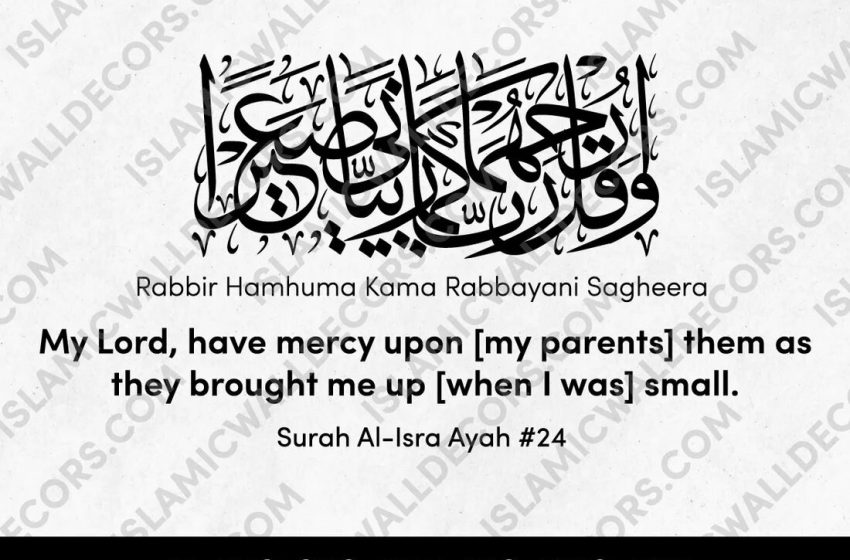Rabbir ham huma dua for parents in Arabic and English translation, Ara

Dua for Parents in Arabic
The Islamic tradition places immense importance on the practice of making dua, especially the dua for parents in Arabic. This specific form of prayer is a profound expression of love, respect, and gratitude towards one’s parents.
It is not merely a ritual but a heartfelt appeal to Allah, the Almighty, for the well-being, happiness, and forgiveness of parents. In Islam, the relationship with parents is considered sacred, and making dua for them in Arabic is a way to honor this bond.
The Arabic language, being the language of the Quran, adds a special spiritual depth to the dua, believed to enhance its sincerity and effectiveness.
The concept of dua for parents in Arabic goes beyond mere words; it reflects a universal sentiment of filial piety that transcends cultural and linguistic barriers. This practice is deeply embedded in the everyday life of Muslims around the world.
It serves as a constant reminder of the sacrifices and unconditional love parents provide from the moment of birth. This dua is not just for Muslim parents but is a universal message of love and respect towards all parents, regardless of their faith or background.
By regularly making dua for parents in Arabic, individuals reaffirm their commitment to upholding the values of respect, kindness, and gratitude towards their parents as prescribed in Islam.
The Importance of Parents in Islam
In Islam, parents are accorded a status second only to Allah. Numerous verses in the Quran and Hadiths from Prophet Muhammad emphasize the importance of respecting and caring for parents.
Making dua for parents in Arabic is a manifestation of this respect. This practice is not only a religious obligation but also a moral one, reflecting the core values of the Islamic faith. The respect and care for parents are considered among the noblest of deeds, and neglecting them is viewed with great disdain.
The emphasis on making dua for parents in Arabic is not just about the words spoken; it’s about the sentiment behind them. It’s a way of acknowledging the countless sacrifices, love, and care that parents have bestowed upon their children. In many ways, this dua serves as a token of appreciation and a means of giving back, albeit in a small way, for all the efforts parents have invested in raising their children.
In Islamic teachings, kindness to parents is often linked with success in this life and the hereafter, highlighting the spiritual and worldly benefits of this practice.
The act of making dua for parents in Arabic also serves as a moral compass for the younger generation, instilling in them the values of empathy, respect, and gratitude.
This cultural practice is not just about preserving religious traditions; it’s about nurturing a global culture of respect for elders and appreciation of the sacrifices they make.
Why Dua for Parents in Arabic?
Focusing specifically on dua for parents in Arabic holds a special significance due to the language’s close association with the Quran and Islamic teachings. Arabic, being the original language of the Quran, is considered the language of divine communication in Islam.
It’s believed that prayers and supplications made in Arabic carry a deeper spiritual resonance and are more impactful. However, it’s essential to understand that the effectiveness of a dua lies in the sincerity and intention behind it, rather than the language used.
Making dua for parents in Arabic is not just about reciting words; it’s about connecting with those words on a deeper level. It’s about understanding the meaning behind each phrase and internalizing the sentiments they convey.
This process of reflection and connection adds depth to the prayer, making it more than just a recitation – it becomes a heartfelt plea for the well-being and happiness of one’s parents.
Moreover, dua for parents in Arabic is a way to stay connected to one’s cultural and religious roots. In a world where traditional values are often overshadowed by modern lifestyles, this practice helps maintain a link with one’s heritage
It also serves as a bridge between generations, passing down values of respect and gratitude from elders to the youth.
For those not fluent in Arabic, the process of learning and understanding these duas can be a fulfilling journey in itself. It’s a way of immersing oneself in the rich linguistic heritage of Islam and gaining a deeper appreciation of its teachings.
Common Duas for Parents from the Quran
One of the most cherished duas for parents in Arabic is found in the Quran: “Rabbi irhamhuma kama rabbayani sagheera.” This dua, which translates to, “My Lord, have mercy upon them as they brought me up [when I was] small,” encapsulates the essence of gratitude and recognition of parents’ efforts.
This dua is a humble acknowledgement of the countless sacrifices and selfless love parents bestow upon their children.

